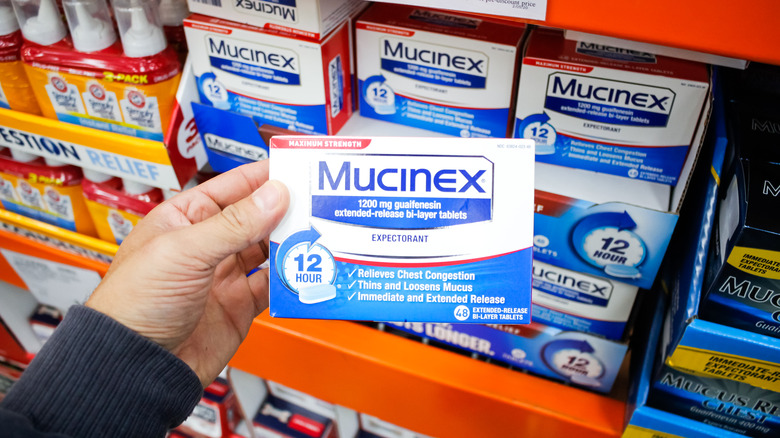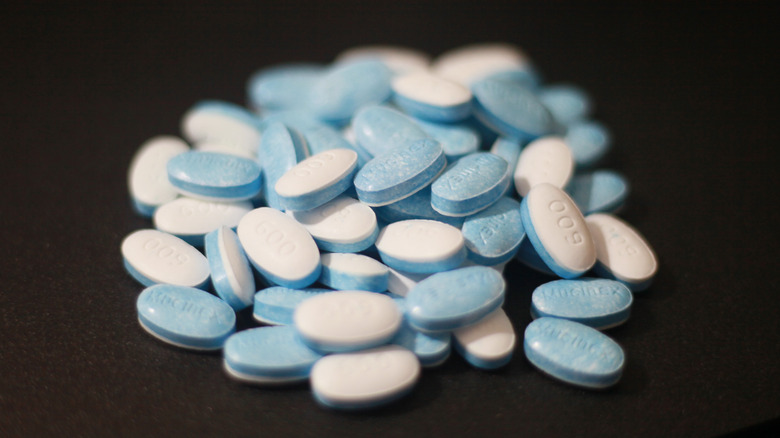This Is How Long It Takes For Mucinex To Start Working
According to the Centers for Disease Control and Prevention, adults get an average of two to three colds annually. This often warrants the need to take medications. Mucinex, also known as guaifenesin, is one such medication. If you've been prescribed this medication, you might be curious about what Mucinex does to the body, its efficacy, and how long it takes for Mucinex to start working.
The Mayo Clinic says Mucinex is available via doctor's prescription and as an over-the-counter drug. It can help clear mucus or phlegm when you have a cold or flu. According to the American Academy of Family Physicians, guaifenesin, the main ingredient in Mucinex, also relieves coughs by thinning or inhibiting the cough reflex in people with upper respiratory infections. Drugs.com adds that guaifenesin's mechanism of action starts by increasing the volume and reducing the viscosity of respiratory tract secretions, making it easier to cough out mucus trapped in airways.
How long does it take for Mucinex to start working?
According to Drugs.com, Mucinex can be fast-acting, and users can start to see improvement in their symptoms within 30 minutes of starting the medication. However, the source adds that it may take up to two days until full effects show. MedlinePlus further notes that guaifenesin comes in various forms, including capsules, extended-release tablets, dissolving granules, and syrups. Your doctor will prescribe the most suitable Mucinex dose and formulation, which might also depend on your medical issue, according to the Mayo Clinic. Following your doctor's directions is crucial to experience the full benefits. As a guide, the Mayo Clinic states that adults usually take 200mg to 400mg every 4 hours as a regular short-acting oral dosage. Children aged on regular short-acting dosages are normally prescribed 50mg to 100mg or 100mg to 200mg, depending on their ages.
According to WebMD, the most effective way to take Mucinex is to swallow the medication whole or split the tablet. The source advises not to crush or chew Mucinex because it can increase the drug's potency and risk side effects. Also, drinking plenty of fluids while taking this medication can help clear congestion, per WebMD.
Side effects of Mucinex
Expectorants like Mucinex can interact with other medications and increase the risk of side effects, according to the Cleveland Clinic. For instance, combining Mucinex with cold and flu medications — especially ones with phenylephrine — can cause harmful interactions, per the Cleveland Clinic. Healthline states that some common side effects of Mucinex include nausea, vomiting, stomach pain, dizziness, headaches, skin rashes, and hives. Serious side effects like kidney stones can occur, even though they are often rare and linked to overuse or misuse.
A 1999 study published in the Journal of Endourology warns that people who take Mucinex are at risk of developing kidney stones if they consume large quantities. They may also eventually become susceptible to alcohol or drug dependency. Some medications with guaifenesin contain pseudoephedrine and nasal decongestants to relieve a congested sinus, according to Drugs.com. Commonly used over-the-counter remedies for colds and coughs, like pseudoephedrine, can lead to harmful cardiovascular side effects, especially decongestants, according to the Harvard Medical School. Pseudoephedrine can adversely affect the heart and increase blood pressure levels, per Healthline.


